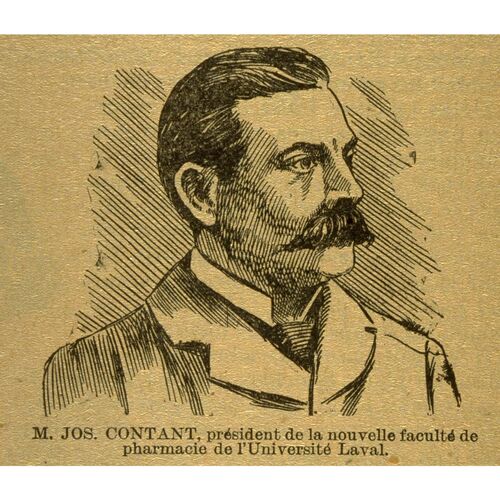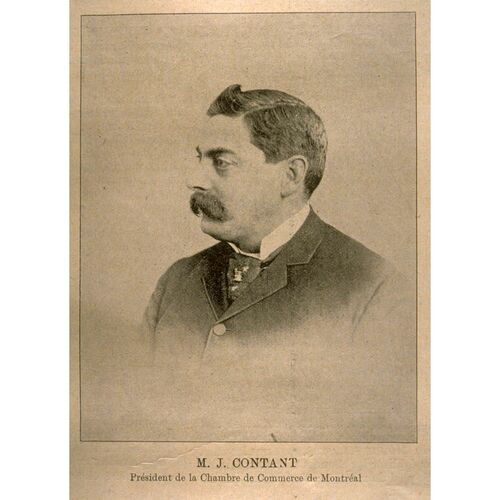CONTANT, JOSEPH (baptized Joseph Comptant, he sometimes signed Joseph-Raoul Contant), pharmacist, professor, and school administrator; b. 1 Oct. 1848 in Stukely-Nord (Bonsecours), Lower Canada, son of Jean-Baptiste Comptant, a farmer, and Pélagie Beaudoin; m. 10 Aug. 1869 Sophie Jetté (d. 6 Dec. 1932) in the parish of Notre-Dame, Montreal, and they had 12 children of whom 7 survived him; d. 24 Oct. 1938 in that city and was buried there on 27 October in Notre-Dame-des-Neiges cemetery.
Joseph Contant pursued classical studies at the Collège Sainte-Marie in Montreal, at least for the school year 1864–65. After a short stay in the United States, he went to work as an apprentice in the pharmacy of the physician Pierre-Étienne Picault in 1866. He also studied at the McGill College medical faculty in 1867–68 and at the Montreal College of Pharmacy (although that would not be its official name until 1879). He obtained his pharmacist’s diploma at the age of 20 and then went into partnership with Picault. On the latter’s death in 1885 Contant purchased the business, located at the corner of Rue Notre-Dame and Rue Bonsecours, which, according to an article published in the daily newspaper La Presse on 1 Oct. 1938, would become “one of the largest pharmacies in the metropolis.” In all probability he ran the business for the rest of his life.
Contant worked energetically to promote rapid economic growth in the French Canadian community. Involved in insurance and mutual-aid work, he was president of Montreal’s Union Saint-Joseph and Union Saint-Pierre in the 1880s. He was a co-founder (1892), director, and president (at the turn of the century) of the Alliance Nationale [see Sir Hormisdas Laporte], and contributed to its development. Along with Laporte and Joseph-Xavier Perrault*, he also helped found the Chambre de Commerce du District de Montréal, which was incorporated in 1887. He became a member of its council that year. The same article in La Presse would note that Contant said this of this creation: “I was walking down Rue Bleury one day with Mr Laporte when I noticed the following sign on a building’s facade: ‘Montreal Board of Trade.’ Why should French Canadians not have their own society, I remarked to Mr Laporte. A few days later the Chambre de Commerce was established.” Le Bureau de Commerce de Montréal already existed for the business community. In this bilingual association – the Montreal Board of Trade in English – the important posts were mostly held by prominent anglophones, and several francophones did not feel that they were well represented. Furthermore, whereas the Montreal Board of Trade was concerned primarily with the financial elite of the metropolis, the Chambre de Commerce du District de Montréal sought a broader membership. Contant was heavily involved in the latter, even serving as its vice-president in 1895 and president in 1896 and 1897. From 1897 to 1901 he was its representative on the Montreal Harbour Commission.
Not only did Contant participate in developing his city, but he also worked for accelerated growth in his profession. Notably, from 1889 to 1891 and from 1893 to 1895 he was president of the Pharmaceutical Association of the Province of Quebec [see John Kerry*], which was incorporated in 1870. Beginning in 1875, this professional body governed admission to the pharmaceutical field. At the end of the 19th century pharmacists were fighting for full control of the manufacture and sale of pharmaceutical products [see David Wesley Bole]. In view of the many breakthroughs in the field of chemistry, which made it possible to provide new medications that were sometimes more effective and often less harmful than those then on the market, they were opposed to the influence of more traditional medicines and to the countless medicinal substances offered by charlatans.
Increasingly numerous at the Montreal College of Pharmacy, francophones wanted a bilingual education. Their growing dissatisfaction led to the creation in 1906 of the École de Pharmacie Laval à Montréal, affiliated with the Université Laval. (It would become the faculty of pharmacy of the Université de Montréal in 1942.) Pharmacy students were then able to pursue a university education and, for the first time, earn a university qualification. Contant and another pharmacist, Alfred-Joseph Laurence, were among the founders. Contant was appointed president and principal in 1906 and would hold these posts until his death in 1938. He also taught courses in deontology and pharmaceutical jurisprudence. At first the instruction provided was focused on practical aspects. In fact, students were required to take only a few theoretical subjects, whereas they had to complete many courses of practical work and spend four years working for a pharmacist to write the examination set by the Pharmaceutical Association of the Province of Quebec. The number of courses needed to obtain a degree would gradually increase. During his career, Contant travelled widely to broaden his pharmaceutical knowledge. All these initiatives made him a mainstay of the discipline’s development in the province of Quebec.
Armed with the experience acquired in founding the École de Pharmacie Laval à Montréal, Contant also took part in setting up the city’s École des Hautes Études Commerciales. In 1889 Contant and a few other members of the Chambre de Commerce du District de Montréal had investigated the matter of commercial studies in the province and had concluded that there was a dearth of such programs. In 1907 the government of Lomer Gouin* created the governing board of the École des Hautes Études Commerciales de Montréal, which officially opened in 1910. Contant was a member of the board, and in addition to carrying out his administrative duties he taught business practice. He was part of the founding group who, while they lacked extensive academic experience, had a background and a network of contacts essential to getting this institution off the ground. Too busy with his work as a pharmacist and as the principal of the École de Pharmacie, he taught for only a few years at the École des Hautes Études Commerciales de Montréal and resigned from the board in 1919.
Joseph Contant, considered by some to be the father of pharmacy in the province of Quebec, worked hard to establish and consolidate organizations that would advance the economic and professional status of French Canadians in the fields of both business and pharmacy.
Joseph Contant is the author of L’Union Saint-Pierre de Montréal: notes sur sa fondation et ses actes jusqu’à nos jours ([Montréal?], 1890).
BANQ-CAM, CE601-S51, 10 août 1869. BANQ-E, CE502-S2, 2 oct. 1848. Le Devoir, 25 oct. 1938. La Patrie, 19 juin 1902. La Presse, 9 déc. 1932; 1er, 25 oct. 1938. H.‑A. Bizier, L’Université de Montréal: la quête du savoir (Montréal, 1993). Johanne Collin et Denis Béliveau, Histoire de la pharmacie au Québec (Montréal, 1994). Pierre Harvey, Histoire de l’École des hautes études commerciales de Montréal (2v., Montréal, 1994–2002), 1 (1887–1926). Roger Larose, “100 years of pharmacy in Quebec,” Canadian Pharmaceutical Journal (Toronto), 105 (1972), no.8: 18–20. Martin Petitclerc, “‘L’association qui crée une nouvelle famille’: l’expérience populaire de la mutualité lors de la transition à la société de marché,” RHAF, 59 (2005–6): 259–91. A. V. Raison, “History of pharmacy in Quebec,” Canadian Pharmaceutical Journal, 100 (1967), no.11: 2–7. Fernande Roy, Progrès, harmonie, liberté: le libéralisme des milieux d’affaires francophones de Montréal au tournant du siècle (Montréal, 1988). Robert Rumilly, Histoire de l’École des hautes études commerciales de Montréal, 1907–1967 (Montréal, 1966).
Cite This Article
Jonathan Fournier, “CONTANT, JOSEPH (baptized Joseph Comptant) (Joseph-Raoul Contant),” in Dictionary of Canadian Biography, vol. 16, University of Toronto/Université Laval, 2003–, accessed February 19, 2026, https://www.biographi.ca/en/bio/contant_joseph_16E.html.
The citation above shows the format for footnotes and endnotes according to the Chicago manual of style (16th edition). Information to be used in other citation formats:
| Permalink: | https://www.biographi.ca/en/bio/contant_joseph_16E.html |
| Author of Article: | Jonathan Fournier |
| Title of Article: | CONTANT, JOSEPH (baptized Joseph Comptant) (Joseph-Raoul Contant) |
| Publication Name: | Dictionary of Canadian Biography, vol. 16 |
| Publisher: | University of Toronto/Université Laval |
| Year of publication: | 2018 |
| Year of revision: | 2018 |
| Access Date: | February 19, 2026 |


![M. J. Contant, président de la Chambre de commerce de Montréal [image fixe] Original title: M. J. Contant, président de la Chambre de commerce de Montréal [image fixe]](/bioimages/w600.7578.jpg)


